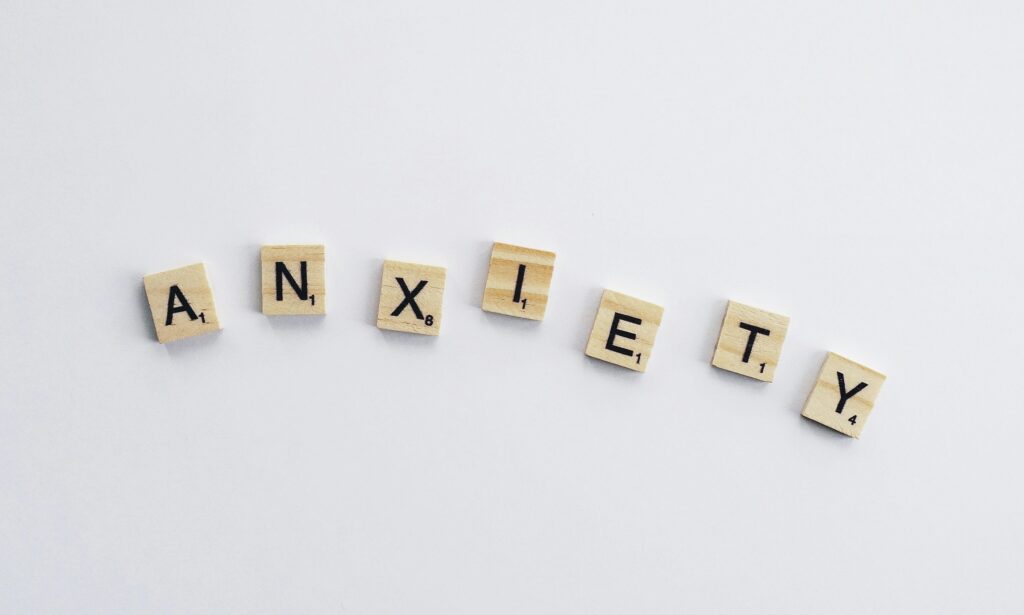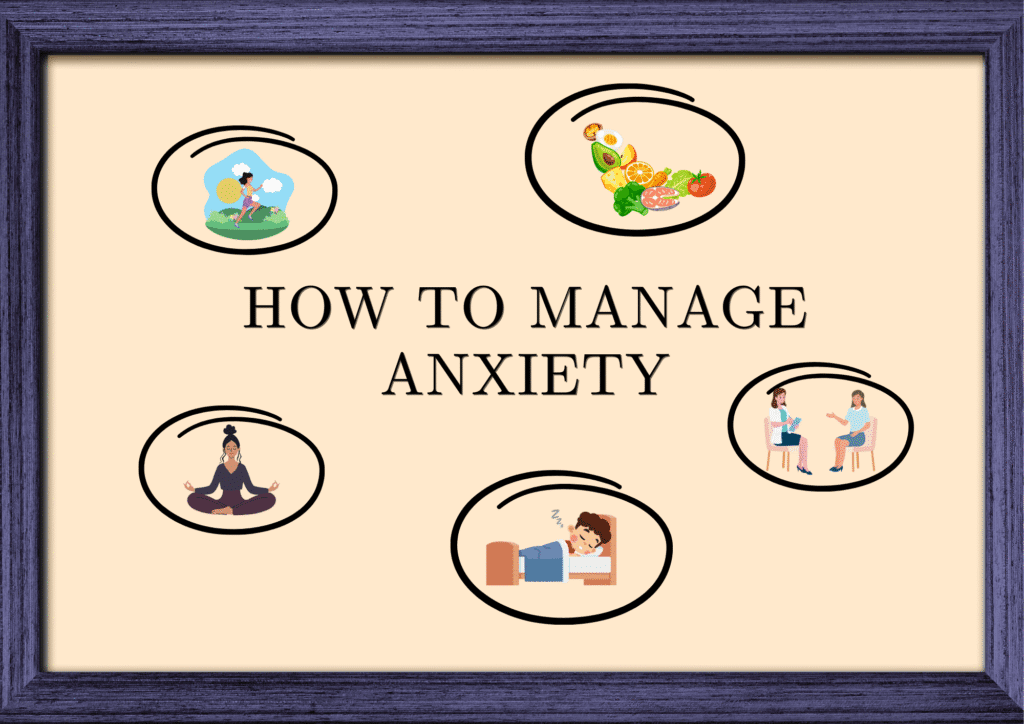What Is Anxiety?
Anxiety is a profound emotional response marked by feelings of unease, worry, or apprehension—ranging from mild to severe. It’s closely tied to the body’s natural fight-or-flight response, designed to help us face perceived threats, but when it becomes excessive or persistent, it can interfere significantly with daily life.
Understanding how to manage anxiety is crucial for maintaining a healthy mind.
How to Recognise Anxiety
Implementing strategies on how to manage anxiety can greatly improve your quality of life.
Anxiety manifests across three domains: physical, emotional (or mental), and behavioural. Recognising and differentiating these symptoms can help you understand your experiences and take the next steps to manage it more effectively.
Physical Symptoms
- Racing or pounding heartbeat, shortness of breath, or tightness in the chest
- Sweating, trembling, lightheadedness, nausea, headaches
- Digestive issues or “nervous pooping,” particularly during heightened stress
Emotional (Mental) Symptoms
- Persistent, excessive worry or dread about future events
- Feeling tense, irritable, unable to relax, or overwhelm
- Difficulty concentrating, obsessive and catastrophic thinking
Behavioural Symptoms
- Restlessness, pacing, agitation, or changes in sleeping and eating patterns
- Avoiding places, tasks, or new experiences that trigger anxiety
- Compulsive behaviours like checking, reassurance, seeking, or social withdrawal

How to Manage Anxiety
You’re not alone. Anxiety is an invisible weight that millions of us silently carry, even those who outwardly seem strong, successful, and composed. In the fitness and wellness world, we often celebrate resilience, discipline, and pushing through discomfort, but what about the emotional strain we don’t see? What happens when the real battle isn’t just on the treadmill, but in your own mind?
Anxiety can derail your progress, disrupt your routines, and cloud your ability to show up for yourself. Recognising and managing anxiety isn’t a sign of weakness—it’s an act of strength, self-respect, and essential to achieving holistic health. The good news is, there are practical strategies you can start using right away to calm your mind, support your body, and create a greater sense of balance. These aren’t quick fixes, but small, consistent actions that can make a big difference over time. Here are 10 proven ways to help you manage anxiety and reclaim your sense of control.
1. Practice Mindfulness and Meditation
In our fast-paced world, it’s easy to get caught up in the whirlwind of thoughts and worries. Mindfulness and meditation offer a sanctuary—a moment to pause, breathe, and reconnect with the present. By focusing your attention on the here and now, you can reduce the grip of anxiety and foster a sense of inner peace.
TIPS:
- Start Small: Dedicate just 5-10 minutes daily to mindfulness practices.
- Guided Sessions: Utilize apps or online resources for structured meditation.
- Consistency is Key: Make it a daily habit to reap long-term benefits.
2. Engage in Regular Physical Activity
Physical activity isn’t just about building muscles or shedding pounds; it’s a powerful tool against anxiety. Exercise releases endorphins—natural mood lifters—that combat stress and promote a sense of well-being.
RECOMMENDATIONS:
- Find Your Fit: Whether it’s yoga, dancing, or a brisk walk, choose activities you enjoy.
- Set Realistic Goals: Aim for at least 30 minutes of moderate exercise most days.
- Stay Consistent: Regularity amplifies the mental health benefits of physical activity.
Learn more on how to start a good routine.
3. Maintain a Balanced Diet
What you eat profoundly impacts how you feel. A diet rich in nutrients supports brain health and can alleviate anxiety symptoms. Conversely, processed foods and excessive sugar can exacerbate mood disorders.
BENEFICIAL FOODS:
- Omega-3 Fatty Acids: Found in fatty fish like salmon, they support brain function.
- Leafy Greens: Packed with magnesium, which can have calming effects.
- Whole Grains: Provide steady energy and support serotonin production.
Learn effective ways on how to build a healthy meal here.
4. Prioritise Quality Sleep
Sleep and anxiety are intricately linked. Lack of rest can heighten anxiety levels, while anxiety can disrupt sleep patterns. Prioritizing quality sleep is essential for mental resilience.
Tips for Better Sleep:
- Establish a Routine: Go to bed and wake up at consistent times.
- Create a Restful Environment: Ensure your bedroom is cool, dark, and quiet.
- Limit Screen Time: Avoid electronic devices at least an hour before bedtime.
5. Limit Caffeine and Alcohol Intake
While a cup of coffee or a glass of wine might seem comforting, both caffeine and alcohol can interfere with your body’s natural stress responses. Moderation is crucial.
SUGGESTIONS:
- Monitor Consumption: Be aware of how these substances affect your mood.
- Seek Alternatives: Opt for herbal teas or decaffeinated beverages.
- Stay Hydrated: Drink plenty of water throughout the day.

6. Seek Professional Support
There’s strength in seeking help. Therapists and counselors can provide tools and strategies tailored to your unique experiences, helping you navigate anxiety more effectively.
WHEN TO SEEK HELP:
- Persistent Symptoms: If anxiety interferes with daily life or relationships.
- Physical Symptoms: Experiencing unexplained aches, fatigue, or digestive issues.
- Overwhelming Emotions: Feeling constantly overwhelmed or on edge.
7. Utilise Relaxation Techniques
Incorporating relaxation techniques into your routine can help calm the mind and reduce anxiety. These practices activate the body’s relaxation response, countering the stress-induced fight-or-flight reaction.
TRY:
- Deep Breathing: Inhale slowly through your nose, hold, and exhale through your mouth.
- Progressive Muscle Relaxation: Tense and release different muscle groups.
- Visualisation: Imagine a peaceful scene or place to transport your mind.
8. Build a Supportive Social Network
Human connection is a powerful antidote to anxiety. Sharing your feelings with trusted friends or family members can provide comfort and perspective.
SUGGESTIONS:
- Stay Connected: Regularly reach out to loved ones, even if just for a chat.
- Join Groups: Engage in community activities or support groups.
- Be Open: Share your experiences and listen to others without judgment.
9. Keep a Journal
Writing down your thoughts can be a therapeutic way to process emotions and identify anxiety triggers. Journaling provides clarity and can help track progress over time.
HOW TO START:
- Set Aside Time: Dedicate a few minutes each day to write.
- Be Honest: Express your feelings without self-censorship.
- Reflect: Review past entries to recognize patterns and growth.
10. Set Realistic Goals
Setting achievable goals provides direction and a sense of purpose. Breaking tasks into manageable steps can prevent feeling overwhelmed and boost confidence.
TIPS:
- Be Specific: Clearly define what you want to achieve.
- Set Deadlines: Establish timelines to stay motivated.
- Celebrate Successes: Acknowledge and reward your progress.
Conclusion
Managing anxiety is not about achieving perfection, it’s about progress, balance, and giving yourself grace. With consistent effort, these strategies can help you create a healthier relationship with your mind and body. By prioritizing mental wellness, you’ll not only enhance your physical fitness but also empower every area of your life.

